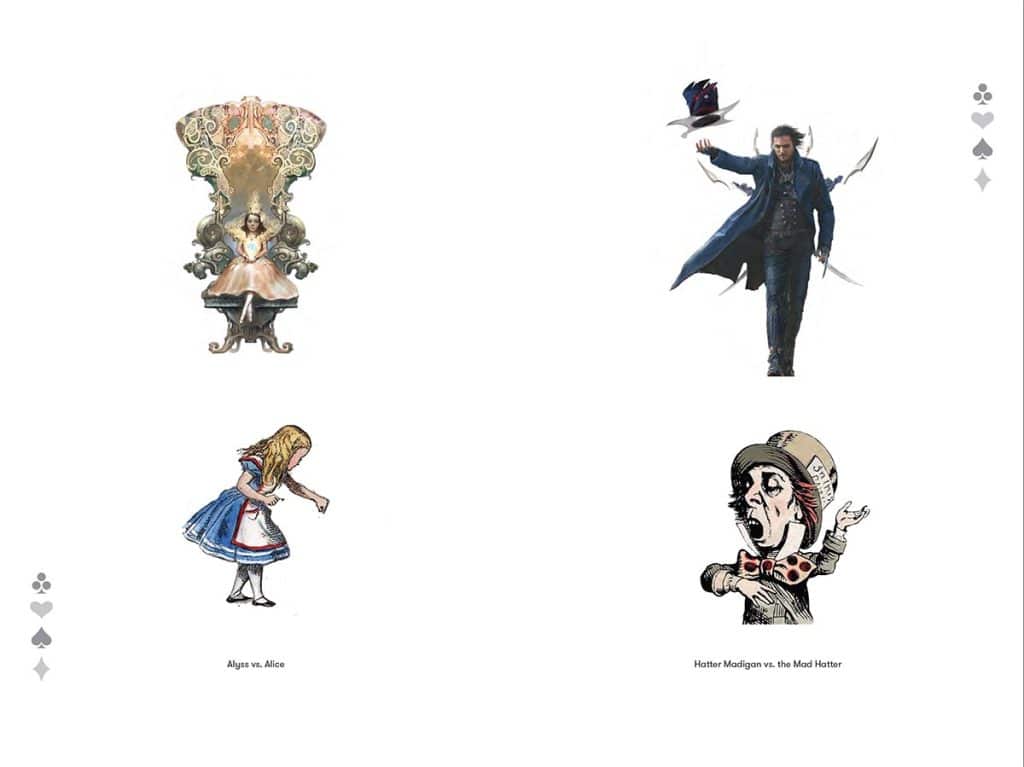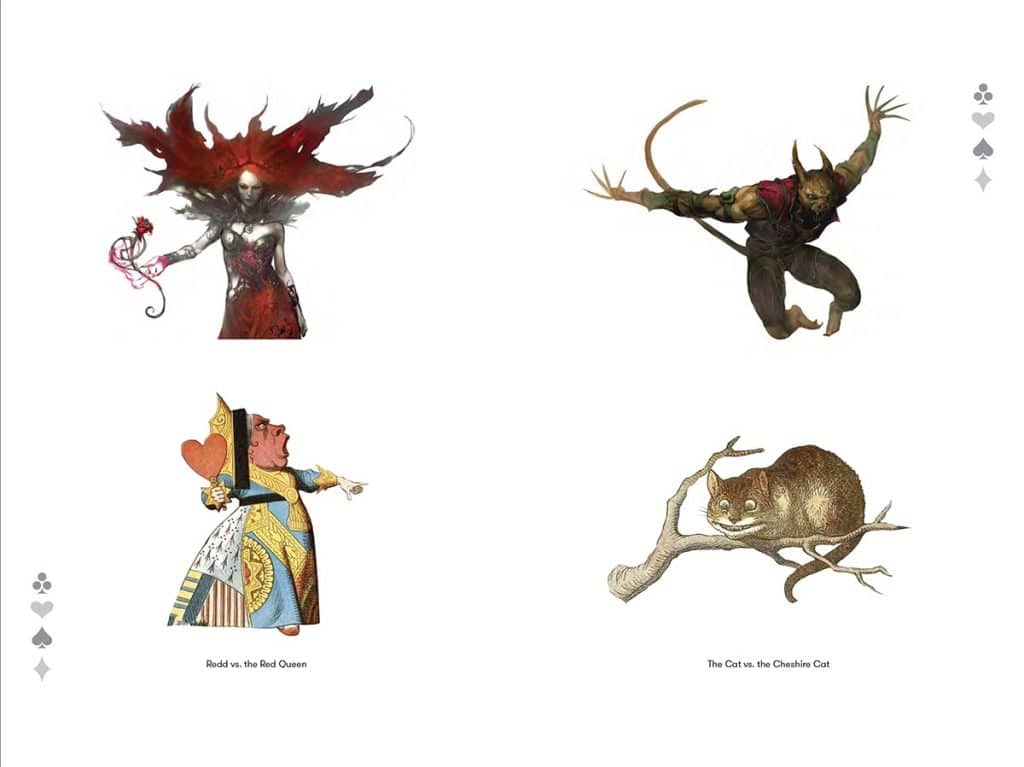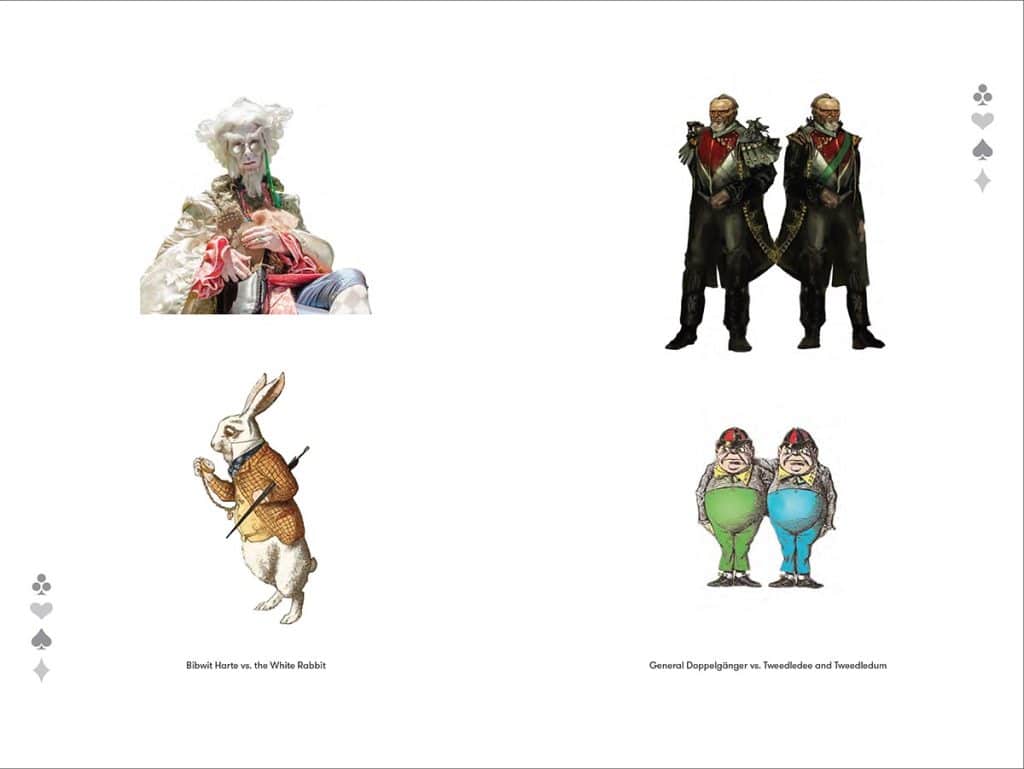What if I told you that a titan of IP slumbers largely untapped? That while only a fraction of its potential has been realized, it’s already a worldwide cultural phenomenon? What if I told you that I was talking about Lewis Carroll’s ALICE’S ADVENTURES IN WONDERLAND?
Immediately, from the title alone, you probably envision the blonde little girl in her powder blue dress (major props to Disney!). She’s etched into our collective brain. The story of her adventures has sold more than 150 million copies and been translated into 176 languages; adapted countless times for film, TV, and every other corner of pop culture. Not bad for two books written a century and a half ago by a scholar inspired by a real little girl.
The problem? Not one of these adaptions and spin-offs has exposed the truth about that little girl; not one has hinted at the expansive, multi-cultural, multi-generational saga from which Carroll borrowed his material. There is unparalleled potential here. The insane success of Carroll’s story and all of its subsequent iterations, along with the feeding frenzy I have personally witnessed when Wonderland fans get a taste of what actually happened, convince me that the time is ripe to bring the truth to the screen.
My trilogy, THE LOOKING GLASS WARS, chronicles the dark yet empowering reality behind Lewis Carroll’s fantasies. It has amassed an audience of millions of eager readers— vocal readers who reach out to me every day, clamoring for the books to be turned into a film or tv series.
In my research for the trilogy, I teased out the connections between historical fact and Carroll’s wondrous fiction, and I discovered a universe of content that, though at odds with Carroll’s books, is unique in its ability to captivate a new generation of Wonderland fans. Even more, I discovered that the passive female “Alice” has represented for over a century was actually a confident, powerful, norm-busting heroine perfectly suited to anchor an epic in the 21st century.
Alice Liddell (née Alyss Heart) tipped the political and social apple carts of her time. Orphaned with an outlandish history no one believed, she grew up to become Lewis Carroll’s muse, rising to the highest echelons of Oxford society and even gaining the love of Queen Victoria's youngest son, Prince Leopold. She fought against social injustice in all its guises, contending with a criminal enterprise à la PEAKY BLINDERS while simultaneously rebelling against monarchical customs à la THE CROWN, earning the ire of Queen Victoria herself.
THE LOOKING GLASS WARS, is much more than a coming-of-age tale featuring a single remarkable woman. It speaks to the human need for creativity, imagination, and story— a need that transcends time and cultural divides. It’s a show driven by universal questions of identity, self-expression, and self-determination.
When we stare into a looking glass, what do we see? What are the stories we tell ourselves about ourselves? By rewriting such stories, to what extent do we change? In a world dominated by social media, where false autobiographies in the form of tweets and Instagram feeds lead many into existential doubt— these are particularly resonant questions.
The show offers a panoramic cast of characters with emotional depth, navigating morally ambiguous situations; characters who seem to represent us yet are wholly themselves—individual, unique; characters with whom we stumble through heart-rending dramas familiar to modern audiences. Love, betrayal, political scheming, fraternal and familial bonds stretched to their breaking points, a war for imagination raging in two worlds…we lean in, gasp, needing to know more.
THE LOOKING GLASS WARS— no less fantastic for being grounded in reality, complete with all of the magical elements so beloved by Lewis Carroll fans— expands the geographical and psychological borders of one of the most recognizable franchises in entertainment.
But that’s marketing-speak and absolutely not the point.
Why do we need to make THE LOOKING GLASS WARS? Why now? For one very important reason:
Because this is a story about the defense of creativity. About the defense of imagination.
We’re living in a world where nothing makes sense anymore. The fake has become real. And the real fake. Our society has lost its identity; it’s been disrupted and distorted. In media. In culture. In politics. In everything.
What work is more relevant that this one?
Alice in Wonderland is the archetypal story of distortion and disruption.
So, you’re not buying into a property. You’re tapping into one of the touchstones of our culture.
But you need a way in. A way that would connect the dots for a new generation. For decades to come.
And THE LOOKING GLASS WARS is that story brought to life today.
Madly yours,
Frank Beddor
There is no "What If?" only "What is."
You may have heard the story. One summer afternoon in July 1862, Charles Dodgson, a young Oxford don, took a boat trip up the River Isis with Dean Henry Liddell’s three daughters, one of whom was named Alice.
Dodgson and the Liddells stopped for a picnic along the riverbank, and to amuse Alice, who was rather bored with the outing, Dodgson told her about a girl, very much like herself, who fell down a rabbit-hole into a magical realm of mad tea parties, disappearing cats, absurd queens, and tardy rabbits worrying over pocket-watches.
Three years later, under the pseudonym Lewis Carroll, Dodgson published his whimsical tale as ALICE’S ADVENTURES IN WONDERLAND, whose characters and conceits have since taken up permanent residence in humankind’s imagination.
So goes the story— the lie, the myth.
But that day on the riverbank, Charles Dodgson did not invent a yarn for Alice’s entertainment. It was she who did the talking, and not for diversion, but out of desperation. She told him the harrowing history of her life as Princess Alyss Heart of Wonderland.
Dodgson, for well-intentioned but misguided reasons, decided to alter Alyss’s story in his published novel, and the truth has lain hidden from the world for more than 150 years.
Until now.
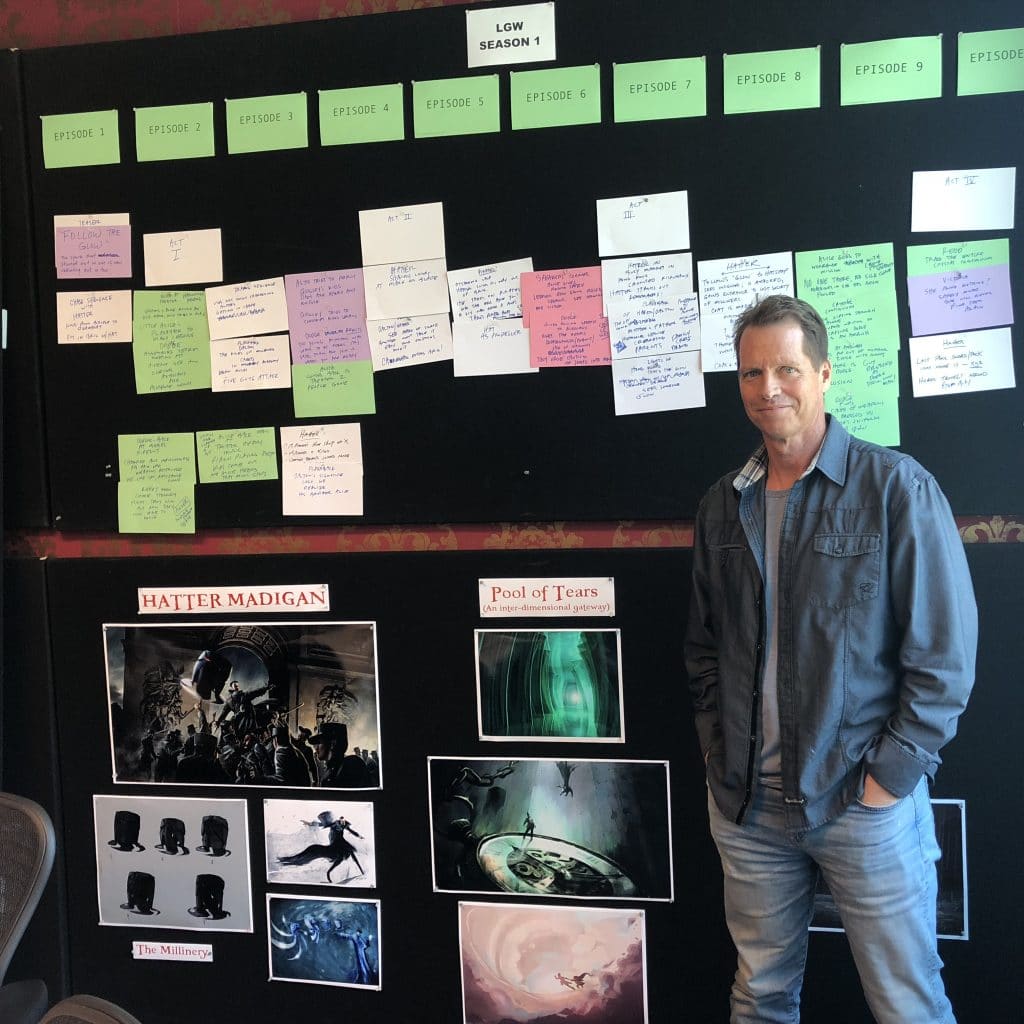
Forget everything you know about Wonderland— the fanciful, childish nonsense depicted by Lewis Carroll, the whimsical creatures featured in Disney’s animated series and films. Forget even graphic novel adaptions that tend toward the gothic but still rely heavily on Carroll’s books. And the prim young girl in the blue dress? Forget her, too. She’s pure fiction.
The truth is much darker, more psychologically complex, more sophisticated, teeming with plot and intrigue, bigger and broader in scope. And more threatening…to us.
Alyss Heart’s birthplace, the real Wonderland, is a parallel world and the seedbed of imagination throughout the cosmos. All of humankind’s scientific advancements, masterpieces of art and engineering, and cultural shifts are manifestations of creativity inherited from Wonderland, where imagination is capable of creating tangible things. Sometimes, such tangibles are created in an instant, while other times an imaginatively gifted Wonderlander is more like an inventor at her desk, experimenting, working through trial and error to bring a vision to actuality. In short, imagination is the magic of our show. Another way to think of it: THE LOOKING GLASS WARS has imagination; STAR WARS has the force.
Imagination itself—which flows constantly from Wonderland to our world, influencing creation and behavior everywhere— is a neutral energy, given shape and character by those channeling it. As this energy is articulated, it can be an instrument for beauty (Light Imagination) or a tool of terror and destruction (Dark Imagination).
As in Wonderland, so too on Earth: Light and Dark Imagination are at war.
Light Imagination is guided by love, justice, a sense of duty to the well-being of others. Everything good in Wonderland and on Earth comes from Light Imagination
Dark Imagination is the product of rage, fear, selfishness, and pain; spurred by hate and revenge. Everything evil in Wonderland and on Earth comes from Dark Imagination.
Lewis Carroll knows all of this because Alyss Heart— princess of Wonderland, rightful heir to its throne, forced by circumstance into playing the part of an adoptee in Victorian London— tells him. How she had to escape Wonderland by jumping into The Pool of Tears the night her aunt Redd, a ruthless practitioner of Dark Imagination, murdered her mother Queen Genevieve during a bloody coup. How The Pool of Tears is a portal that brought her to Earth— a poor, homeless, orphaned exile, eventually adopted by Dean Liddell and his family.
Carroll is charmed by Alyss but disturbed by what he presumes to be her make-believe story (he supposes her emotionally scarred from her time on the streets). He wants to render the demons that haunt her into silly things, humorous things, and so he writes Alice’s Adventures in Wonderland, omitting every syllable of truth.
Hurt by this betrayal, distracted by the life around her, Alyss Heart (now Alice Liddell) eventually forgets herself. Her Wonderland memories fade to dreams and then to nothing, and she’s now grown into a plucky, strong-willed twenty-year-old elbowing her way through a man’s society.
But if Alyss doesn’t remember her true past soon, if she doesn’t reclaim Wonderland’s throne in the service of Light Imagination, the realm will descend further into a hellscape from which it may never recover.
While for us…
An overflow of Dark Imagination will spill over the entire globe—influencing, corrupting, poisoning everything everywhere. As long as Redd Heart remains Wonderland’s queen, our future will be in doubt, the advancements of the coming centuries in dire jeopardy.
What’s at stake, then, is nothing less than imagination itself—Dark threatening to eclipse Light for all time, and without Light Imagination, no world is worth living in. But for Alyss to remember who she is, for her to successfully battle Redd and ensure Wonderland’s future, as well as our own, she’s going to need the help of some old friends, including one very badass HATTER MADIGAN.
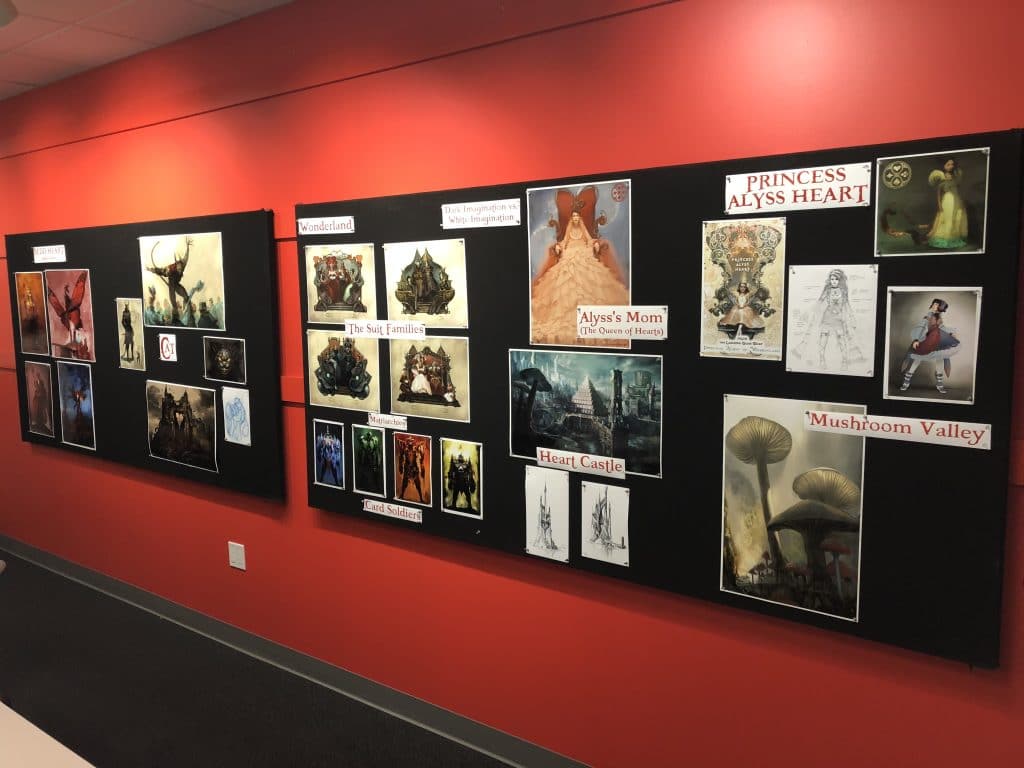
THE LOOKING GLASS WARS series, is a science-fantasy with a modern-informed aesthetic, dramatizes an epic both profoundly new and yet—evolved from mythic archetypes as it is—deeply familiar.
The story spans two worlds connected by the flow of imagination—Wonderland and 19th century Earth. We begin in Victorian England, where, with ALYSS HEART, we witness the lows of society— the muck and grime, workhouses, debtor’s prisons, gangs, street urchins. We also witness the highs— the ostentatious wealth and privilege, including that of the royal family. With Alyss, we are buffeted by classism and the flare-ups of social unrest that result. All of this is presented in a very grounded style, true to life.
But THE LOOKING GLASS WARS isn’t strictly a period piece. Over the course of the story, as more of Wonderland encroaches upon Earth, the more that realm’s fantastic elements—its characters, creatures, colors, and textures—impede on our gray-by-comparison reality. In this way, with an increasing intermingling of the Victorian and Wonderlandian until they become one, the look of the show echoes the internal changes wrought in Alyss Heart as she remembers who she truly is and questions where her destiny lies.
But again, this not your mother’s Wonderland, populated with eccentric cartoonish characters who speak in riddles and behave nonsensically. No, as sci-fi as our Wonderland seems, with its cityscapes akin to glittering precious stones, technology that far outstrips our own, beasts like the ferocious jabberwocky, battalions of living chessmen and card soldiers— despite all of this, our Wonderland is a place of intrigue, political machinations, violence, deception, sex, thwarted ambitions, and hopeful aspirations. Our Wonderland is home to characters ranging from the naively good to the thoroughly corrupt. A lot like Victorian London. A lot like our world now.
Accordingly, our show treats Wonderland in the same, matter-of-fact style it does the patently realistic London. For as colorful, lush, and incredible as Wonderland is to us, the world is real for its citizens— a world where imagination is a palpable, magical force, where the extraordinary is ordinary and what we would call impossible is an everyday occurrence.
As different as our Wonderland is from Lewis Carroll’s version, or anyone else’s, fans of the original novel will be able to puzzle out familiar names and faces. Carroll’s white rabbit is BIBWIT HARTE, the anxious albino tutor employed by the ruling Heart family. The Cheshire Cat, in our show, is known simply as THE CAT, a shape-shifting feline assassin, who, it turns out, is anything but simple. Tweedledee and Tweedledum are recognizable as GENERAL DOPPELGÄNGER, who commands Wonderland’s military and is capable of splitting into separate but identical individuals—General Doppel and General Gänger. And Lewis Carroll’s hookah-smoking caterpillar? In THE LOOKING GLASS WARS there is more than one, and these hippo-sized larvae are ancient oracles, masters of imaginative power, and loyal only to the Heart Crystal from which all imagination emanates. Then there’s the Mad Hatter, whom viewers will come to see as an absurd representation of our charismatic anti-hero HATTER MADIGAN (think Han Solo or Jack Sparrow).
Doubles abound. Because of Wonderland’s influence in all thing’s imagination, the inhabitants and doings of Earth often seem a reflection of that other world. Main Wonderland characters have counterparts on Earth, who are loosely similar in temperament; actors can portray dual roles.
Events are also mirrored. We’ll see plenty of parallels between Wonderland during Redd Heart’s tyranny and the UK under Queen Victoria. For example, the Industrial Revolution, which Victoria rides herd over as queen, and in which people are valued only so much as they can be cogs in some behemoth monopoly machine, is a direct result of mass “dehumanization” taking place in Wonderland under Redd.
At times historically accurate, other times futuristic, kinetic in pace, grounded in character, THE LOOKING GLASS WARS is a wonder-verse unto itself, a mash-up of timeless elements in which not only Alyss Heart but many others find that character is destiny, and destiny is legacy.
Great shows, the most successful films, need great characters—ones founded in archetypes that represent the most fundamental human experiences; characters who partake of the universal, making them easy to identify with, and whose successes and failures evoke deep emotions. The chosen one, the hero and anti-hero, the rebel, the sage— THE LOOKING GLASS WARS, a timely story with timeless appeal, has them all.
For a more intimate acquaintance with our lead characters, please check out our upcoming blogs.
